HIS2AWA: Examining the Cold War: Ideas, Resources, and Power Dynamics
VerifiedAdded on 2023/03/23
|9
|2441
|61
Essay
AI Summary
This essay explores the causes of the Cold War, arguing that it was a multifaceted conflict driven by ideological differences between communism and capitalism, competition for resources, and a power struggle between the USSR and the Western powers led by the United States. The ideological clash stemmed from the fundamental opposition between the communist vision of a classless society and the capitalist emphasis on democracy and free markets. The desire for territorial expansion and control over vital resources, such as oil and uranium, further fueled tensions. The development and use of atomic weapons introduced a new dimension of power struggle, intensifying the rivalry between the superpowers. The essay concludes that the Cold War was not attributable to a single factor but rather a combination of ideological, economic, and political forces that created a prolonged period of global tension.
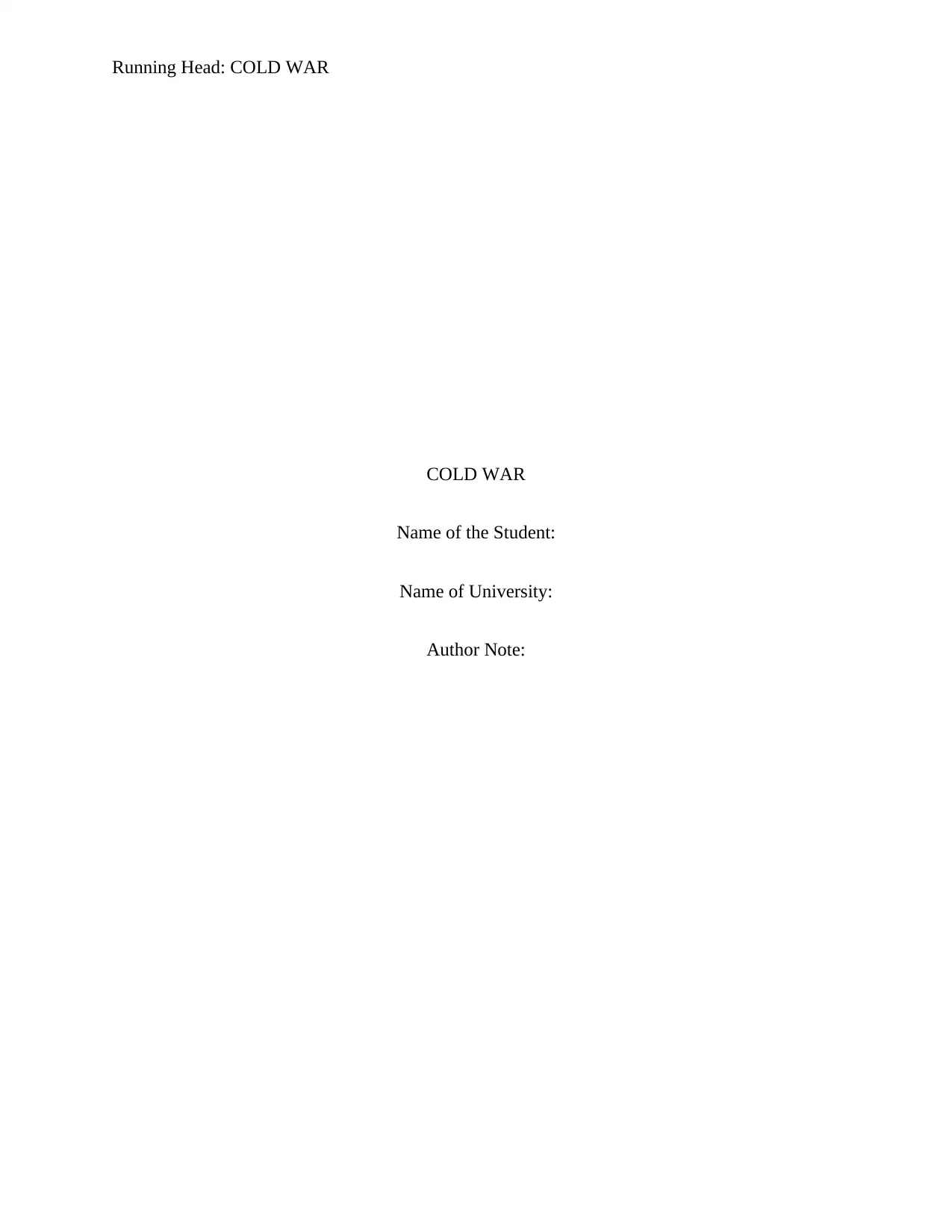
Running Head: COLD WAR
COLD WAR
Name of the Student:
Name of University:
Author Note:
COLD WAR
Name of the Student:
Name of University:
Author Note:
Paraphrase This Document
Need a fresh take? Get an instant paraphrase of this document with our AI Paraphraser
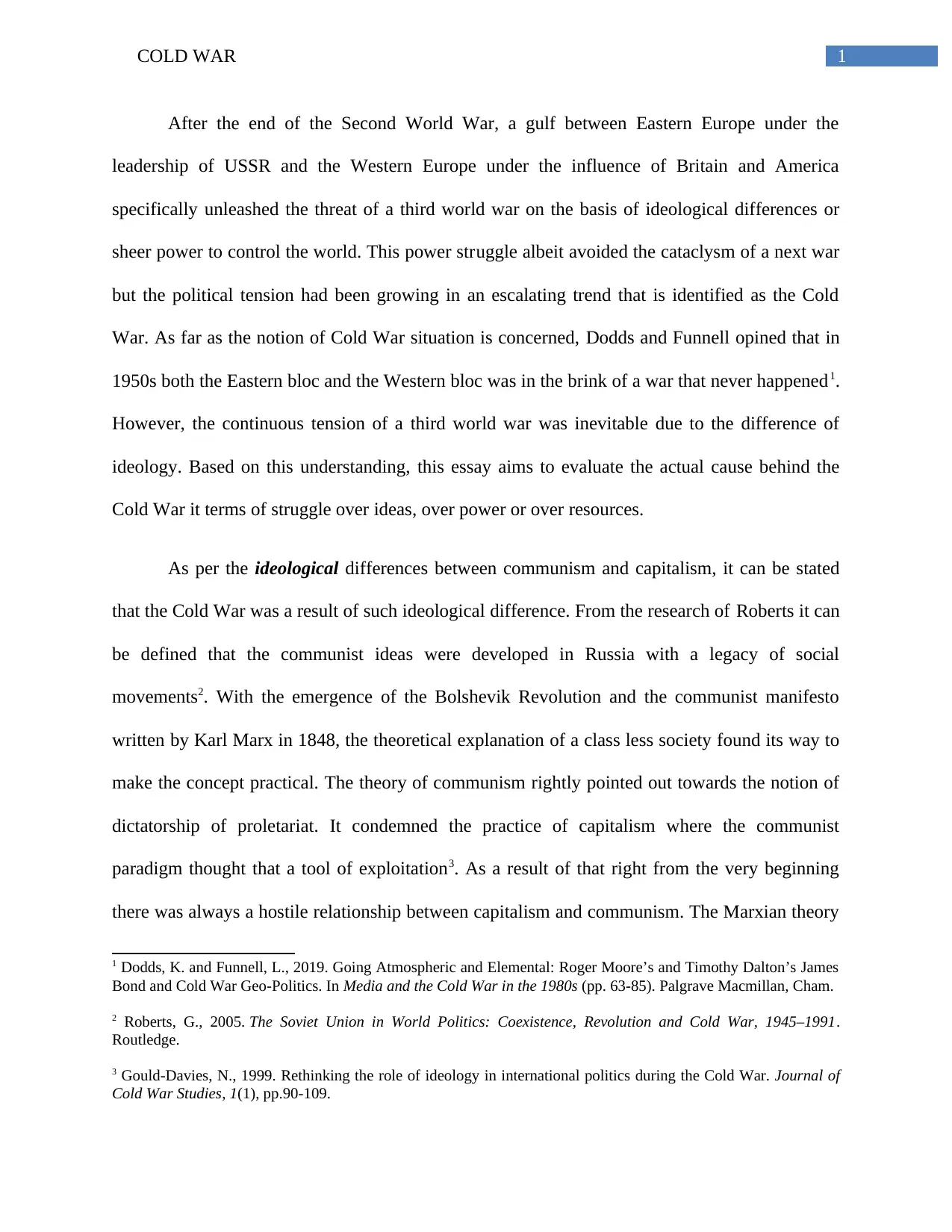
1COLD WAR
After the end of the Second World War, a gulf between Eastern Europe under the
leadership of USSR and the Western Europe under the influence of Britain and America
specifically unleashed the threat of a third world war on the basis of ideological differences or
sheer power to control the world. This power struggle albeit avoided the cataclysm of a next war
but the political tension had been growing in an escalating trend that is identified as the Cold
War. As far as the notion of Cold War situation is concerned, Dodds and Funnell opined that in
1950s both the Eastern bloc and the Western bloc was in the brink of a war that never happened1.
However, the continuous tension of a third world war was inevitable due to the difference of
ideology. Based on this understanding, this essay aims to evaluate the actual cause behind the
Cold War it terms of struggle over ideas, over power or over resources.
As per the ideological differences between communism and capitalism, it can be stated
that the Cold War was a result of such ideological difference. From the research of Roberts it can
be defined that the communist ideas were developed in Russia with a legacy of social
movements2. With the emergence of the Bolshevik Revolution and the communist manifesto
written by Karl Marx in 1848, the theoretical explanation of a class less society found its way to
make the concept practical. The theory of communism rightly pointed out towards the notion of
dictatorship of proletariat. It condemned the practice of capitalism where the communist
paradigm thought that a tool of exploitation3. As a result of that right from the very beginning
there was always a hostile relationship between capitalism and communism. The Marxian theory
1 Dodds, K. and Funnell, L., 2019. Going Atmospheric and Elemental: Roger Moore’s and Timothy Dalton’s James
Bond and Cold War Geo-Politics. In Media and the Cold War in the 1980s (pp. 63-85). Palgrave Macmillan, Cham.
2 Roberts, G., 2005. The Soviet Union in World Politics: Coexistence, Revolution and Cold War, 1945–1991.
Routledge.
3 Gould-Davies, N., 1999. Rethinking the role of ideology in international politics during the Cold War. Journal of
Cold War Studies, 1(1), pp.90-109.
After the end of the Second World War, a gulf between Eastern Europe under the
leadership of USSR and the Western Europe under the influence of Britain and America
specifically unleashed the threat of a third world war on the basis of ideological differences or
sheer power to control the world. This power struggle albeit avoided the cataclysm of a next war
but the political tension had been growing in an escalating trend that is identified as the Cold
War. As far as the notion of Cold War situation is concerned, Dodds and Funnell opined that in
1950s both the Eastern bloc and the Western bloc was in the brink of a war that never happened1.
However, the continuous tension of a third world war was inevitable due to the difference of
ideology. Based on this understanding, this essay aims to evaluate the actual cause behind the
Cold War it terms of struggle over ideas, over power or over resources.
As per the ideological differences between communism and capitalism, it can be stated
that the Cold War was a result of such ideological difference. From the research of Roberts it can
be defined that the communist ideas were developed in Russia with a legacy of social
movements2. With the emergence of the Bolshevik Revolution and the communist manifesto
written by Karl Marx in 1848, the theoretical explanation of a class less society found its way to
make the concept practical. The theory of communism rightly pointed out towards the notion of
dictatorship of proletariat. It condemned the practice of capitalism where the communist
paradigm thought that a tool of exploitation3. As a result of that right from the very beginning
there was always a hostile relationship between capitalism and communism. The Marxian theory
1 Dodds, K. and Funnell, L., 2019. Going Atmospheric and Elemental: Roger Moore’s and Timothy Dalton’s James
Bond and Cold War Geo-Politics. In Media and the Cold War in the 1980s (pp. 63-85). Palgrave Macmillan, Cham.
2 Roberts, G., 2005. The Soviet Union in World Politics: Coexistence, Revolution and Cold War, 1945–1991.
Routledge.
3 Gould-Davies, N., 1999. Rethinking the role of ideology in international politics during the Cold War. Journal of
Cold War Studies, 1(1), pp.90-109.
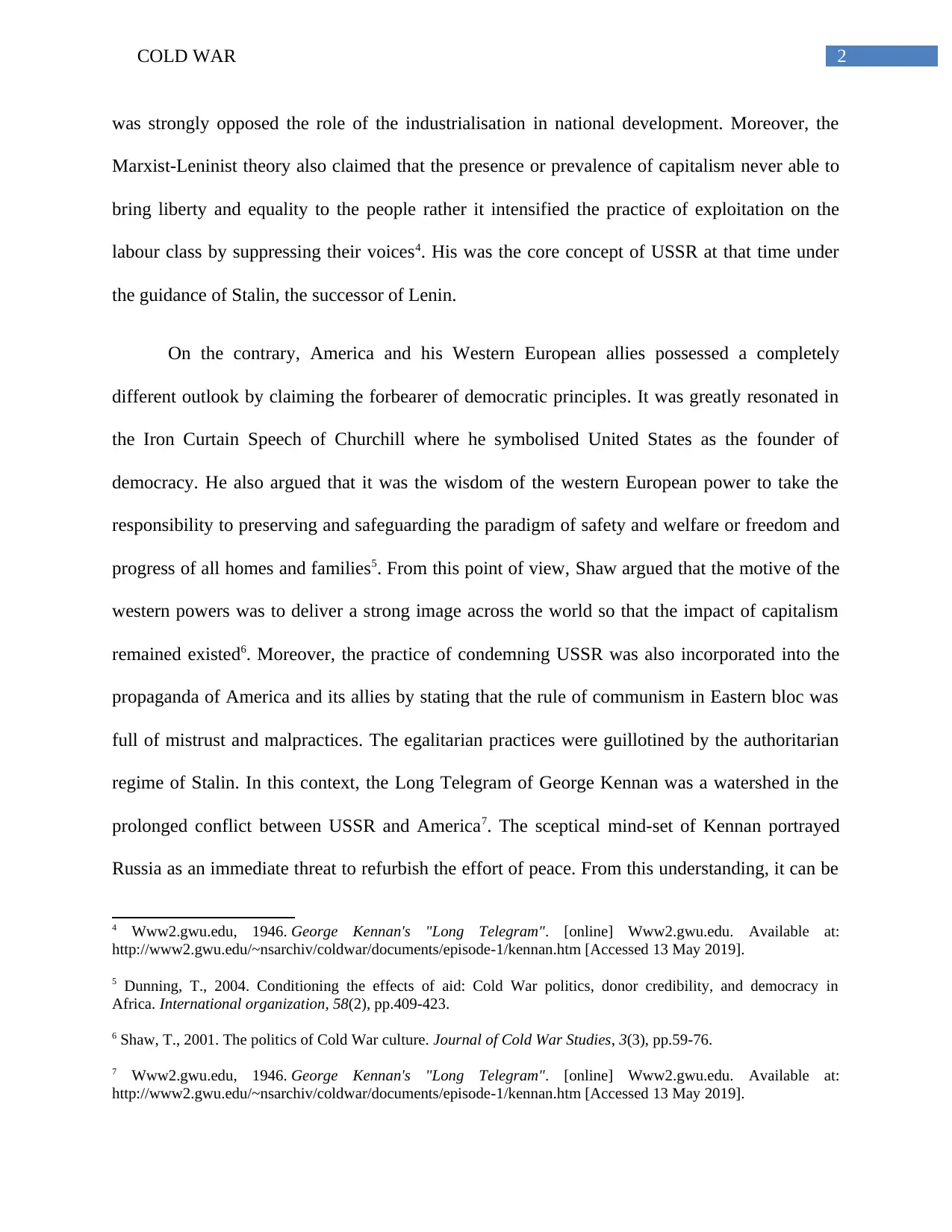
2COLD WAR
was strongly opposed the role of the industrialisation in national development. Moreover, the
Marxist-Leninist theory also claimed that the presence or prevalence of capitalism never able to
bring liberty and equality to the people rather it intensified the practice of exploitation on the
labour class by suppressing their voices4. His was the core concept of USSR at that time under
the guidance of Stalin, the successor of Lenin.
On the contrary, America and his Western European allies possessed a completely
different outlook by claiming the forbearer of democratic principles. It was greatly resonated in
the Iron Curtain Speech of Churchill where he symbolised United States as the founder of
democracy. He also argued that it was the wisdom of the western European power to take the
responsibility to preserving and safeguarding the paradigm of safety and welfare or freedom and
progress of all homes and families5. From this point of view, Shaw argued that the motive of the
western powers was to deliver a strong image across the world so that the impact of capitalism
remained existed6. Moreover, the practice of condemning USSR was also incorporated into the
propaganda of America and its allies by stating that the rule of communism in Eastern bloc was
full of mistrust and malpractices. The egalitarian practices were guillotined by the authoritarian
regime of Stalin. In this context, the Long Telegram of George Kennan was a watershed in the
prolonged conflict between USSR and America7. The sceptical mind-set of Kennan portrayed
Russia as an immediate threat to refurbish the effort of peace. From this understanding, it can be
4 Www2.gwu.edu, 1946. George Kennan's "Long Telegram". [online] Www2.gwu.edu. Available at:
http://www2.gwu.edu/~nsarchiv/coldwar/documents/episode-1/kennan.htm [Accessed 13 May 2019].
5 Dunning, T., 2004. Conditioning the effects of aid: Cold War politics, donor credibility, and democracy in
Africa. International organization, 58(2), pp.409-423.
6 Shaw, T., 2001. The politics of Cold War culture. Journal of Cold War Studies, 3(3), pp.59-76.
7 Www2.gwu.edu, 1946. George Kennan's "Long Telegram". [online] Www2.gwu.edu. Available at:
http://www2.gwu.edu/~nsarchiv/coldwar/documents/episode-1/kennan.htm [Accessed 13 May 2019].
was strongly opposed the role of the industrialisation in national development. Moreover, the
Marxist-Leninist theory also claimed that the presence or prevalence of capitalism never able to
bring liberty and equality to the people rather it intensified the practice of exploitation on the
labour class by suppressing their voices4. His was the core concept of USSR at that time under
the guidance of Stalin, the successor of Lenin.
On the contrary, America and his Western European allies possessed a completely
different outlook by claiming the forbearer of democratic principles. It was greatly resonated in
the Iron Curtain Speech of Churchill where he symbolised United States as the founder of
democracy. He also argued that it was the wisdom of the western European power to take the
responsibility to preserving and safeguarding the paradigm of safety and welfare or freedom and
progress of all homes and families5. From this point of view, Shaw argued that the motive of the
western powers was to deliver a strong image across the world so that the impact of capitalism
remained existed6. Moreover, the practice of condemning USSR was also incorporated into the
propaganda of America and its allies by stating that the rule of communism in Eastern bloc was
full of mistrust and malpractices. The egalitarian practices were guillotined by the authoritarian
regime of Stalin. In this context, the Long Telegram of George Kennan was a watershed in the
prolonged conflict between USSR and America7. The sceptical mind-set of Kennan portrayed
Russia as an immediate threat to refurbish the effort of peace. From this understanding, it can be
4 Www2.gwu.edu, 1946. George Kennan's "Long Telegram". [online] Www2.gwu.edu. Available at:
http://www2.gwu.edu/~nsarchiv/coldwar/documents/episode-1/kennan.htm [Accessed 13 May 2019].
5 Dunning, T., 2004. Conditioning the effects of aid: Cold War politics, donor credibility, and democracy in
Africa. International organization, 58(2), pp.409-423.
6 Shaw, T., 2001. The politics of Cold War culture. Journal of Cold War Studies, 3(3), pp.59-76.
7 Www2.gwu.edu, 1946. George Kennan's "Long Telegram". [online] Www2.gwu.edu. Available at:
http://www2.gwu.edu/~nsarchiv/coldwar/documents/episode-1/kennan.htm [Accessed 13 May 2019].
⊘ This is a preview!⊘
Do you want full access?
Subscribe today to unlock all pages.

Trusted by 1+ million students worldwide
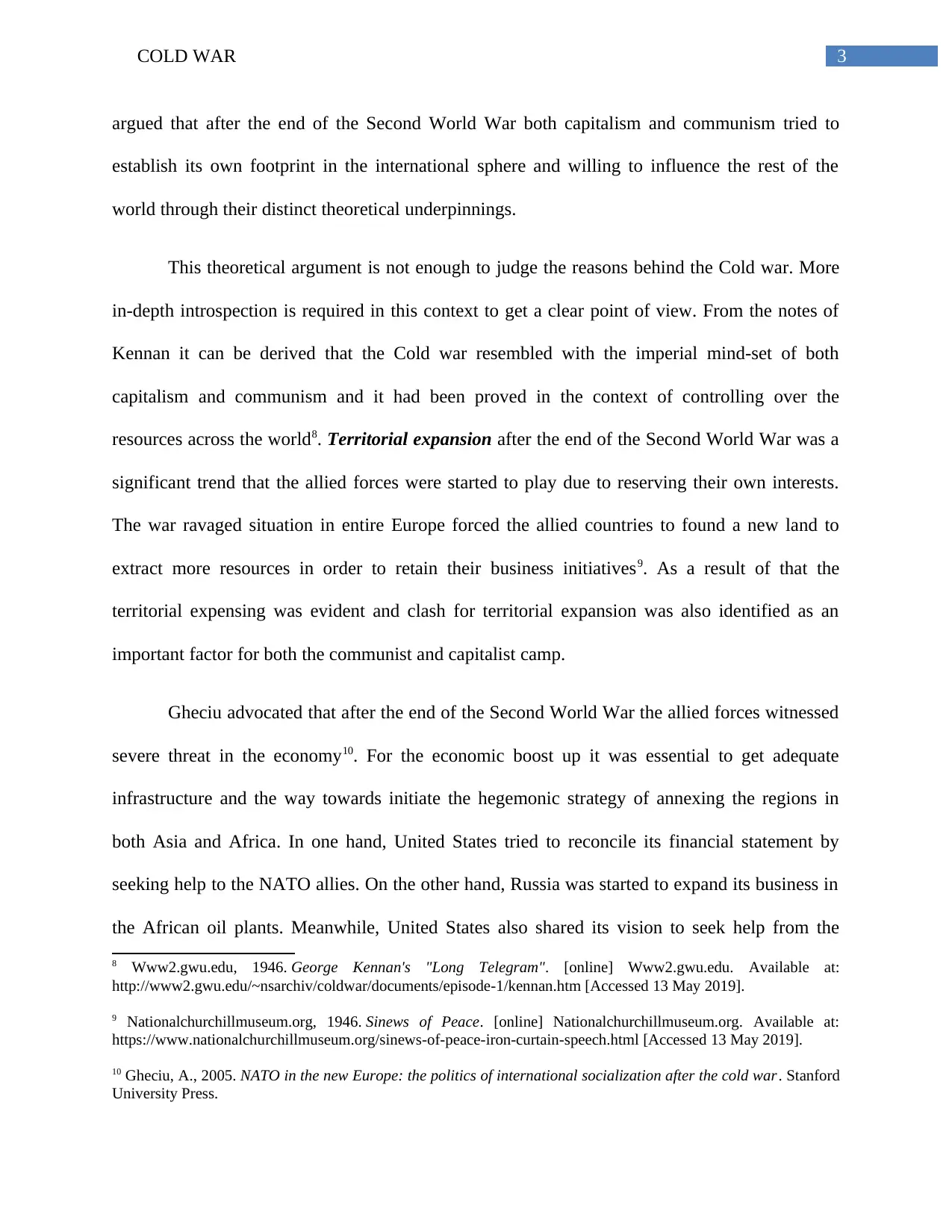
3COLD WAR
argued that after the end of the Second World War both capitalism and communism tried to
establish its own footprint in the international sphere and willing to influence the rest of the
world through their distinct theoretical underpinnings.
This theoretical argument is not enough to judge the reasons behind the Cold war. More
in-depth introspection is required in this context to get a clear point of view. From the notes of
Kennan it can be derived that the Cold war resembled with the imperial mind-set of both
capitalism and communism and it had been proved in the context of controlling over the
resources across the world8. Territorial expansion after the end of the Second World War was a
significant trend that the allied forces were started to play due to reserving their own interests.
The war ravaged situation in entire Europe forced the allied countries to found a new land to
extract more resources in order to retain their business initiatives9. As a result of that the
territorial expensing was evident and clash for territorial expansion was also identified as an
important factor for both the communist and capitalist camp.
Gheciu advocated that after the end of the Second World War the allied forces witnessed
severe threat in the economy10. For the economic boost up it was essential to get adequate
infrastructure and the way towards initiate the hegemonic strategy of annexing the regions in
both Asia and Africa. In one hand, United States tried to reconcile its financial statement by
seeking help to the NATO allies. On the other hand, Russia was started to expand its business in
the African oil plants. Meanwhile, United States also shared its vision to seek help from the
8 Www2.gwu.edu, 1946. George Kennan's "Long Telegram". [online] Www2.gwu.edu. Available at:
http://www2.gwu.edu/~nsarchiv/coldwar/documents/episode-1/kennan.htm [Accessed 13 May 2019].
9 Nationalchurchillmuseum.org, 1946. Sinews of Peace. [online] Nationalchurchillmuseum.org. Available at:
https://www.nationalchurchillmuseum.org/sinews-of-peace-iron-curtain-speech.html [Accessed 13 May 2019].
10 Gheciu, A., 2005. NATO in the new Europe: the politics of international socialization after the cold war. Stanford
University Press.
argued that after the end of the Second World War both capitalism and communism tried to
establish its own footprint in the international sphere and willing to influence the rest of the
world through their distinct theoretical underpinnings.
This theoretical argument is not enough to judge the reasons behind the Cold war. More
in-depth introspection is required in this context to get a clear point of view. From the notes of
Kennan it can be derived that the Cold war resembled with the imperial mind-set of both
capitalism and communism and it had been proved in the context of controlling over the
resources across the world8. Territorial expansion after the end of the Second World War was a
significant trend that the allied forces were started to play due to reserving their own interests.
The war ravaged situation in entire Europe forced the allied countries to found a new land to
extract more resources in order to retain their business initiatives9. As a result of that the
territorial expensing was evident and clash for territorial expansion was also identified as an
important factor for both the communist and capitalist camp.
Gheciu advocated that after the end of the Second World War the allied forces witnessed
severe threat in the economy10. For the economic boost up it was essential to get adequate
infrastructure and the way towards initiate the hegemonic strategy of annexing the regions in
both Asia and Africa. In one hand, United States tried to reconcile its financial statement by
seeking help to the NATO allies. On the other hand, Russia was started to expand its business in
the African oil plants. Meanwhile, United States also shared its vision to seek help from the
8 Www2.gwu.edu, 1946. George Kennan's "Long Telegram". [online] Www2.gwu.edu. Available at:
http://www2.gwu.edu/~nsarchiv/coldwar/documents/episode-1/kennan.htm [Accessed 13 May 2019].
9 Nationalchurchillmuseum.org, 1946. Sinews of Peace. [online] Nationalchurchillmuseum.org. Available at:
https://www.nationalchurchillmuseum.org/sinews-of-peace-iron-curtain-speech.html [Accessed 13 May 2019].
10 Gheciu, A., 2005. NATO in the new Europe: the politics of international socialization after the cold war. Stanford
University Press.
Paraphrase This Document
Need a fresh take? Get an instant paraphrase of this document with our AI Paraphraser
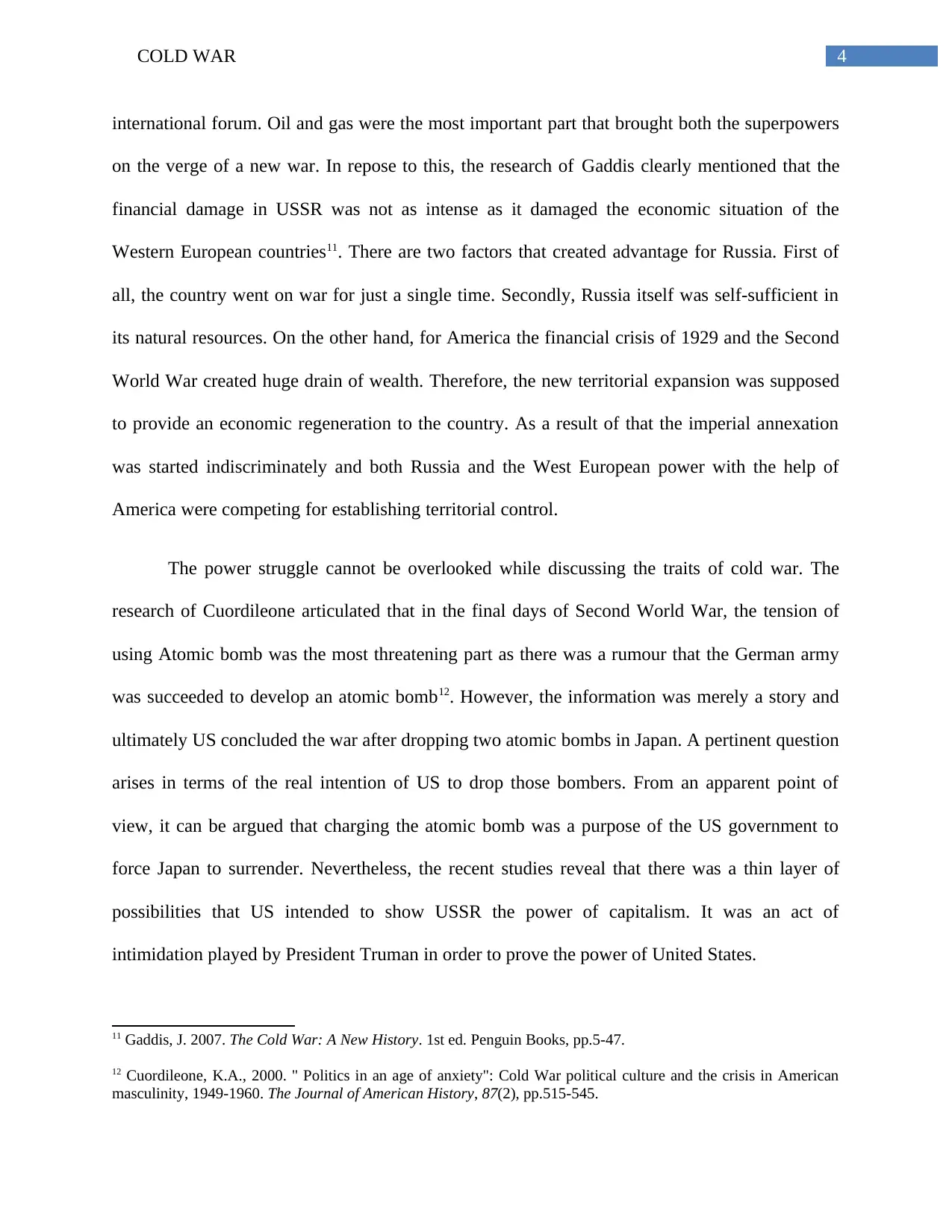
4COLD WAR
international forum. Oil and gas were the most important part that brought both the superpowers
on the verge of a new war. In repose to this, the research of Gaddis clearly mentioned that the
financial damage in USSR was not as intense as it damaged the economic situation of the
Western European countries11. There are two factors that created advantage for Russia. First of
all, the country went on war for just a single time. Secondly, Russia itself was self-sufficient in
its natural resources. On the other hand, for America the financial crisis of 1929 and the Second
World War created huge drain of wealth. Therefore, the new territorial expansion was supposed
to provide an economic regeneration to the country. As a result of that the imperial annexation
was started indiscriminately and both Russia and the West European power with the help of
America were competing for establishing territorial control.
The power struggle cannot be overlooked while discussing the traits of cold war. The
research of Cuordileone articulated that in the final days of Second World War, the tension of
using Atomic bomb was the most threatening part as there was a rumour that the German army
was succeeded to develop an atomic bomb12. However, the information was merely a story and
ultimately US concluded the war after dropping two atomic bombs in Japan. A pertinent question
arises in terms of the real intention of US to drop those bombers. From an apparent point of
view, it can be argued that charging the atomic bomb was a purpose of the US government to
force Japan to surrender. Nevertheless, the recent studies reveal that there was a thin layer of
possibilities that US intended to show USSR the power of capitalism. It was an act of
intimidation played by President Truman in order to prove the power of United States.
11 Gaddis, J. 2007. The Cold War: A New History. 1st ed. Penguin Books, pp.5-47.
12 Cuordileone, K.A., 2000. " Politics in an age of anxiety": Cold War political culture and the crisis in American
masculinity, 1949-1960. The Journal of American History, 87(2), pp.515-545.
international forum. Oil and gas were the most important part that brought both the superpowers
on the verge of a new war. In repose to this, the research of Gaddis clearly mentioned that the
financial damage in USSR was not as intense as it damaged the economic situation of the
Western European countries11. There are two factors that created advantage for Russia. First of
all, the country went on war for just a single time. Secondly, Russia itself was self-sufficient in
its natural resources. On the other hand, for America the financial crisis of 1929 and the Second
World War created huge drain of wealth. Therefore, the new territorial expansion was supposed
to provide an economic regeneration to the country. As a result of that the imperial annexation
was started indiscriminately and both Russia and the West European power with the help of
America were competing for establishing territorial control.
The power struggle cannot be overlooked while discussing the traits of cold war. The
research of Cuordileone articulated that in the final days of Second World War, the tension of
using Atomic bomb was the most threatening part as there was a rumour that the German army
was succeeded to develop an atomic bomb12. However, the information was merely a story and
ultimately US concluded the war after dropping two atomic bombs in Japan. A pertinent question
arises in terms of the real intention of US to drop those bombers. From an apparent point of
view, it can be argued that charging the atomic bomb was a purpose of the US government to
force Japan to surrender. Nevertheless, the recent studies reveal that there was a thin layer of
possibilities that US intended to show USSR the power of capitalism. It was an act of
intimidation played by President Truman in order to prove the power of United States.
11 Gaddis, J. 2007. The Cold War: A New History. 1st ed. Penguin Books, pp.5-47.
12 Cuordileone, K.A., 2000. " Politics in an age of anxiety": Cold War political culture and the crisis in American
masculinity, 1949-1960. The Journal of American History, 87(2), pp.515-545.
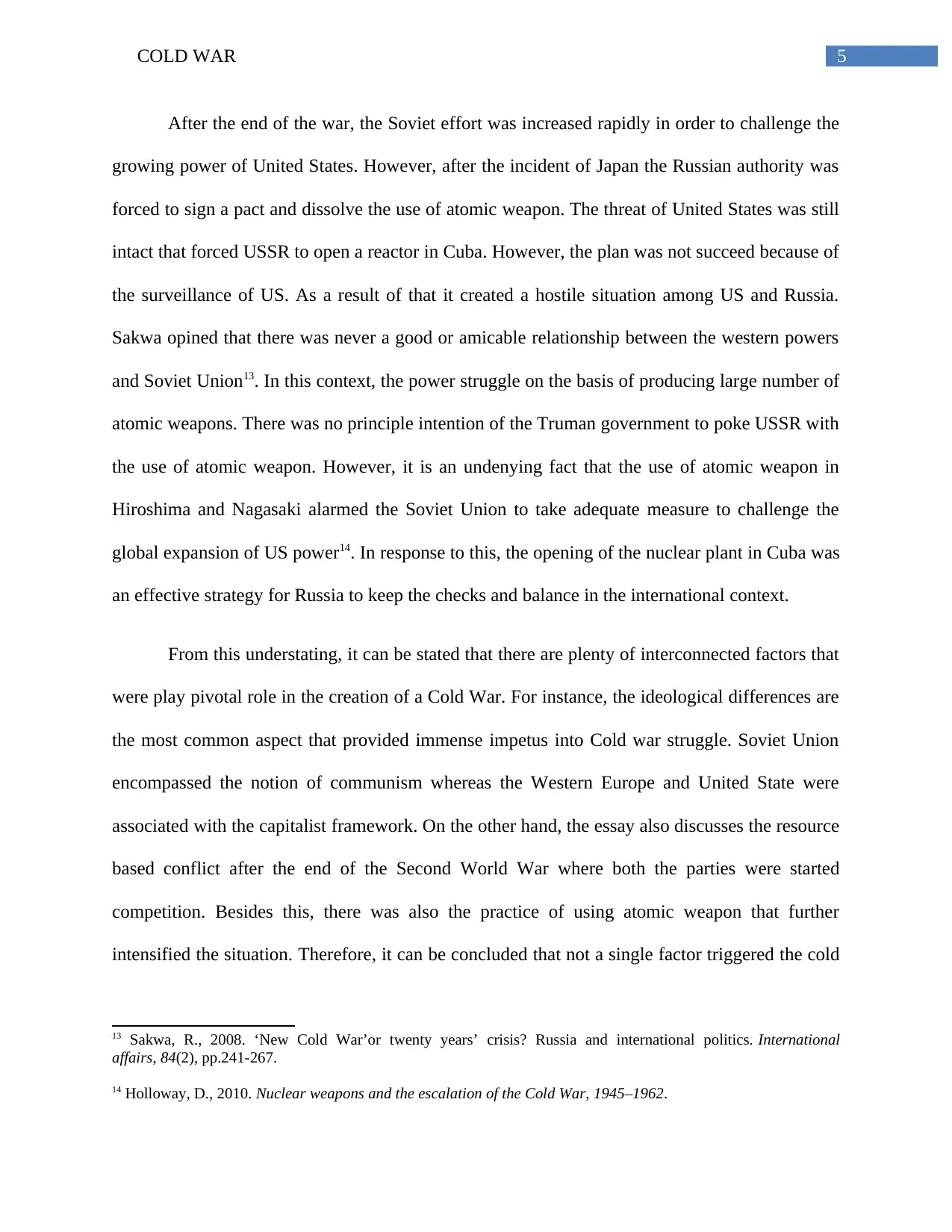
5COLD WAR
After the end of the war, the Soviet effort was increased rapidly in order to challenge the
growing power of United States. However, after the incident of Japan the Russian authority was
forced to sign a pact and dissolve the use of atomic weapon. The threat of United States was still
intact that forced USSR to open a reactor in Cuba. However, the plan was not succeed because of
the surveillance of US. As a result of that it created a hostile situation among US and Russia.
Sakwa opined that there was never a good or amicable relationship between the western powers
and Soviet Union13. In this context, the power struggle on the basis of producing large number of
atomic weapons. There was no principle intention of the Truman government to poke USSR with
the use of atomic weapon. However, it is an undenying fact that the use of atomic weapon in
Hiroshima and Nagasaki alarmed the Soviet Union to take adequate measure to challenge the
global expansion of US power14. In response to this, the opening of the nuclear plant in Cuba was
an effective strategy for Russia to keep the checks and balance in the international context.
From this understating, it can be stated that there are plenty of interconnected factors that
were play pivotal role in the creation of a Cold War. For instance, the ideological differences are
the most common aspect that provided immense impetus into Cold war struggle. Soviet Union
encompassed the notion of communism whereas the Western Europe and United State were
associated with the capitalist framework. On the other hand, the essay also discusses the resource
based conflict after the end of the Second World War where both the parties were started
competition. Besides this, there was also the practice of using atomic weapon that further
intensified the situation. Therefore, it can be concluded that not a single factor triggered the cold
13 Sakwa, R., 2008. ‘New Cold War’or twenty years’ crisis? Russia and international politics. International
affairs, 84(2), pp.241-267.
14 Holloway, D., 2010. Nuclear weapons and the escalation of the Cold War, 1945–1962.
After the end of the war, the Soviet effort was increased rapidly in order to challenge the
growing power of United States. However, after the incident of Japan the Russian authority was
forced to sign a pact and dissolve the use of atomic weapon. The threat of United States was still
intact that forced USSR to open a reactor in Cuba. However, the plan was not succeed because of
the surveillance of US. As a result of that it created a hostile situation among US and Russia.
Sakwa opined that there was never a good or amicable relationship between the western powers
and Soviet Union13. In this context, the power struggle on the basis of producing large number of
atomic weapons. There was no principle intention of the Truman government to poke USSR with
the use of atomic weapon. However, it is an undenying fact that the use of atomic weapon in
Hiroshima and Nagasaki alarmed the Soviet Union to take adequate measure to challenge the
global expansion of US power14. In response to this, the opening of the nuclear plant in Cuba was
an effective strategy for Russia to keep the checks and balance in the international context.
From this understating, it can be stated that there are plenty of interconnected factors that
were play pivotal role in the creation of a Cold War. For instance, the ideological differences are
the most common aspect that provided immense impetus into Cold war struggle. Soviet Union
encompassed the notion of communism whereas the Western Europe and United State were
associated with the capitalist framework. On the other hand, the essay also discusses the resource
based conflict after the end of the Second World War where both the parties were started
competition. Besides this, there was also the practice of using atomic weapon that further
intensified the situation. Therefore, it can be concluded that not a single factor triggered the cold
13 Sakwa, R., 2008. ‘New Cold War’or twenty years’ crisis? Russia and international politics. International
affairs, 84(2), pp.241-267.
14 Holloway, D., 2010. Nuclear weapons and the escalation of the Cold War, 1945–1962.
⊘ This is a preview!⊘
Do you want full access?
Subscribe today to unlock all pages.

Trusted by 1+ million students worldwide
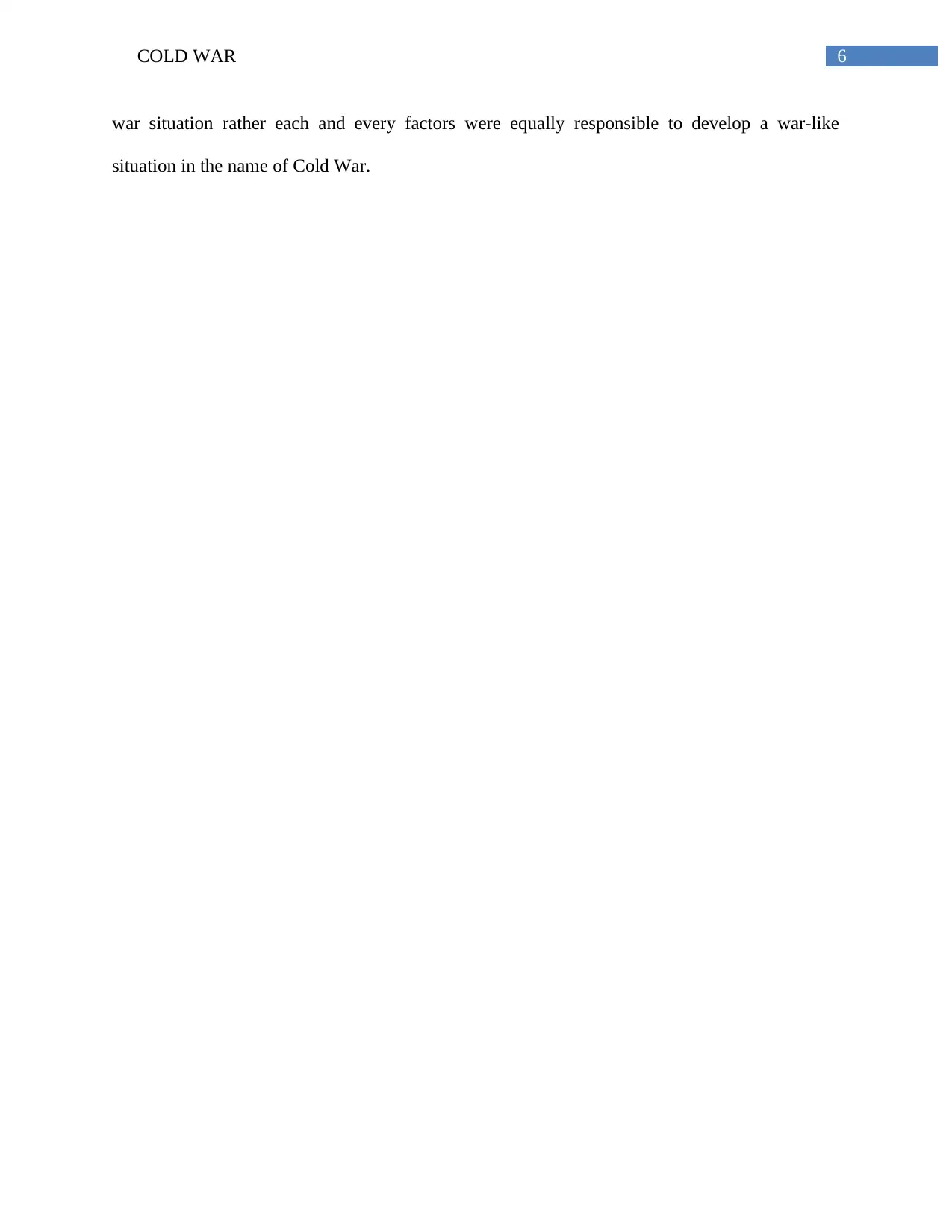
6COLD WAR
war situation rather each and every factors were equally responsible to develop a war-like
situation in the name of Cold War.
war situation rather each and every factors were equally responsible to develop a war-like
situation in the name of Cold War.
Paraphrase This Document
Need a fresh take? Get an instant paraphrase of this document with our AI Paraphraser
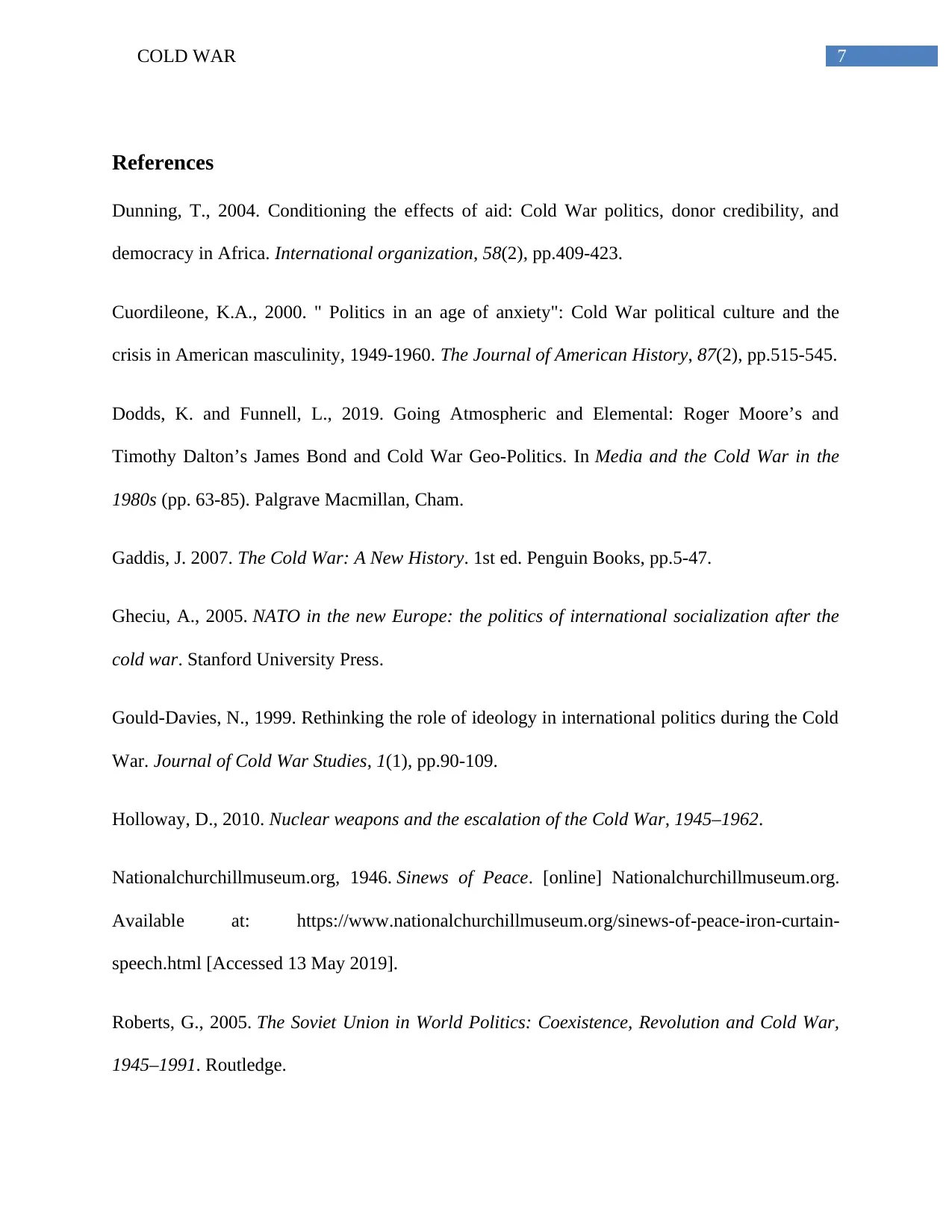
7COLD WAR
References
Dunning, T., 2004. Conditioning the effects of aid: Cold War politics, donor credibility, and
democracy in Africa. International organization, 58(2), pp.409-423.
Cuordileone, K.A., 2000. " Politics in an age of anxiety": Cold War political culture and the
crisis in American masculinity, 1949-1960. The Journal of American History, 87(2), pp.515-545.
Dodds, K. and Funnell, L., 2019. Going Atmospheric and Elemental: Roger Moore’s and
Timothy Dalton’s James Bond and Cold War Geo-Politics. In Media and the Cold War in the
1980s (pp. 63-85). Palgrave Macmillan, Cham.
Gaddis, J. 2007. The Cold War: A New History. 1st ed. Penguin Books, pp.5-47.
Gheciu, A., 2005. NATO in the new Europe: the politics of international socialization after the
cold war. Stanford University Press.
Gould-Davies, N., 1999. Rethinking the role of ideology in international politics during the Cold
War. Journal of Cold War Studies, 1(1), pp.90-109.
Holloway, D., 2010. Nuclear weapons and the escalation of the Cold War, 1945–1962.
Nationalchurchillmuseum.org, 1946. Sinews of Peace. [online] Nationalchurchillmuseum.org.
Available at: https://www.nationalchurchillmuseum.org/sinews-of-peace-iron-curtain-
speech.html [Accessed 13 May 2019].
Roberts, G., 2005. The Soviet Union in World Politics: Coexistence, Revolution and Cold War,
1945–1991. Routledge.
References
Dunning, T., 2004. Conditioning the effects of aid: Cold War politics, donor credibility, and
democracy in Africa. International organization, 58(2), pp.409-423.
Cuordileone, K.A., 2000. " Politics in an age of anxiety": Cold War political culture and the
crisis in American masculinity, 1949-1960. The Journal of American History, 87(2), pp.515-545.
Dodds, K. and Funnell, L., 2019. Going Atmospheric and Elemental: Roger Moore’s and
Timothy Dalton’s James Bond and Cold War Geo-Politics. In Media and the Cold War in the
1980s (pp. 63-85). Palgrave Macmillan, Cham.
Gaddis, J. 2007. The Cold War: A New History. 1st ed. Penguin Books, pp.5-47.
Gheciu, A., 2005. NATO in the new Europe: the politics of international socialization after the
cold war. Stanford University Press.
Gould-Davies, N., 1999. Rethinking the role of ideology in international politics during the Cold
War. Journal of Cold War Studies, 1(1), pp.90-109.
Holloway, D., 2010. Nuclear weapons and the escalation of the Cold War, 1945–1962.
Nationalchurchillmuseum.org, 1946. Sinews of Peace. [online] Nationalchurchillmuseum.org.
Available at: https://www.nationalchurchillmuseum.org/sinews-of-peace-iron-curtain-
speech.html [Accessed 13 May 2019].
Roberts, G., 2005. The Soviet Union in World Politics: Coexistence, Revolution and Cold War,
1945–1991. Routledge.
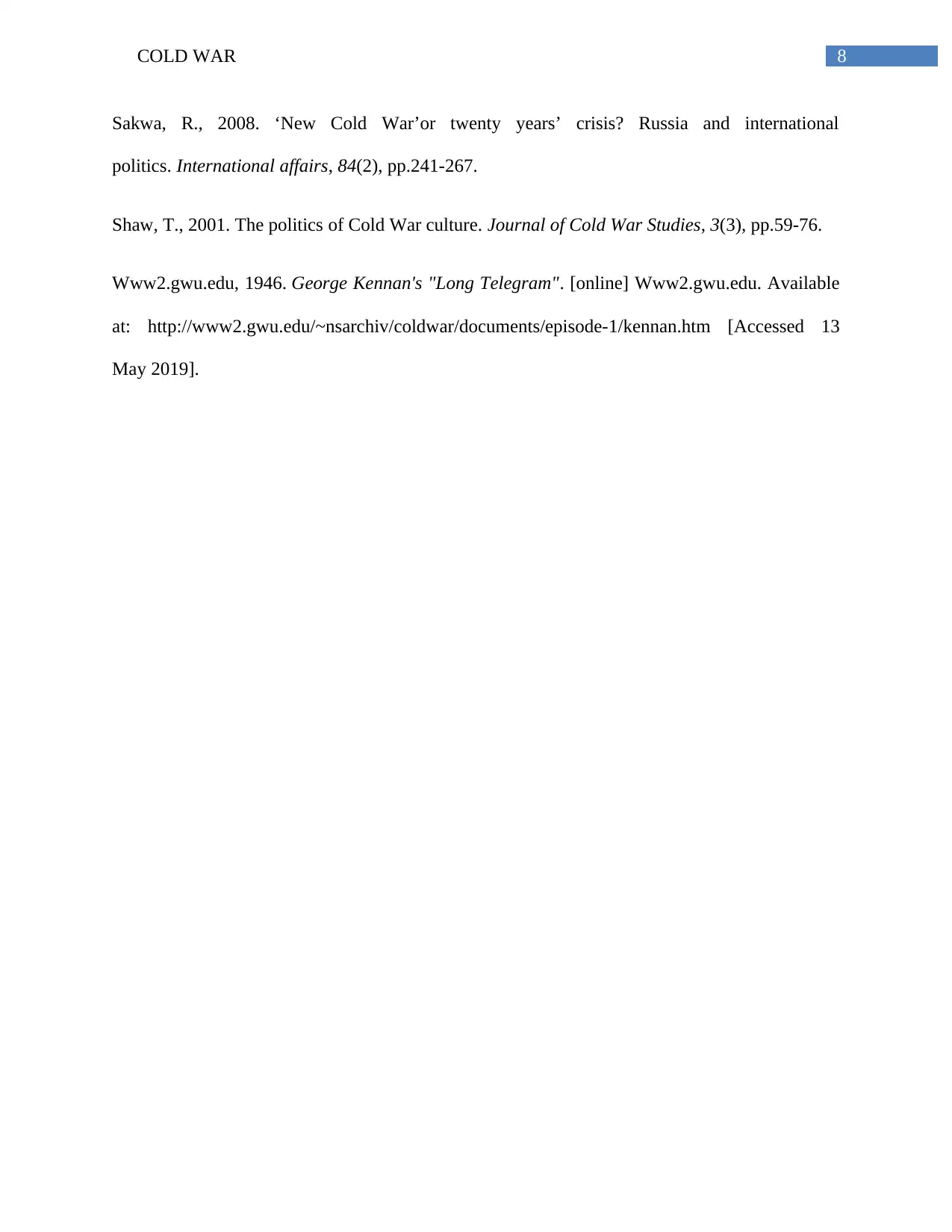
8COLD WAR
Sakwa, R., 2008. ‘New Cold War’or twenty years’ crisis? Russia and international
politics. International affairs, 84(2), pp.241-267.
Shaw, T., 2001. The politics of Cold War culture. Journal of Cold War Studies, 3(3), pp.59-76.
Www2.gwu.edu, 1946. George Kennan's "Long Telegram". [online] Www2.gwu.edu. Available
at: http://www2.gwu.edu/~nsarchiv/coldwar/documents/episode-1/kennan.htm [Accessed 13
May 2019].
Sakwa, R., 2008. ‘New Cold War’or twenty years’ crisis? Russia and international
politics. International affairs, 84(2), pp.241-267.
Shaw, T., 2001. The politics of Cold War culture. Journal of Cold War Studies, 3(3), pp.59-76.
Www2.gwu.edu, 1946. George Kennan's "Long Telegram". [online] Www2.gwu.edu. Available
at: http://www2.gwu.edu/~nsarchiv/coldwar/documents/episode-1/kennan.htm [Accessed 13
May 2019].
⊘ This is a preview!⊘
Do you want full access?
Subscribe today to unlock all pages.

Trusted by 1+ million students worldwide
1 out of 9
Related Documents
Your All-in-One AI-Powered Toolkit for Academic Success.
+13062052269
info@desklib.com
Available 24*7 on WhatsApp / Email
![[object Object]](/_next/static/media/star-bottom.7253800d.svg)
Unlock your academic potential
Copyright © 2020–2026 A2Z Services. All Rights Reserved. Developed and managed by ZUCOL.





